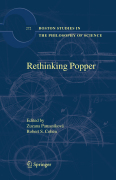
In September 2007, more than 100 philosophers came to Prague with the determination to approach Karl Popper’s philosophy as a source of inspiration in manyareas of our intellectual endeavor. Topics cover Popper’s views on rationality, scientific methodology, the evolution of knowledge and democracy; and sincePopper’s philosophy has always had a strong interdisciplinary influence, partof the volume discusses the impact of his ideas in such areas as education, economics, psychology, biology, or ethics. The concept of falsification, the problem of demarcation, the ban on induction, or the role of the empirical basis, along with the provocative parallels between historicism, holism and totalitarianism, have always caused controversies. The aim of this volume is not to smooth them but show them as a challenge. In this time when the traditional role of reason in the Western thought is being undermined, Popper’s non-foundationist model of reason brings the Enlightenment message into a new perspective. Long standing interest in Popper’s philosophy is brought up to date Optimisticmessage about reason in knowledge and society The value of open critical discourse for both the growth of knowledge and democracy INDICE: Introduction: Zuzana Parusniková & Robert S. Cohen. Part 1: Reason, Logic, Science. Part 2: Epistemology, Methodology, Evolution. Part 3: Society, Politics. Part 4: Ethics, Economics, Education. Index.
- ISBN: 978-1-4020-9337-1
- Editorial: Springer
- Encuadernacion: Desconocida
- Páginas: 430
- Fecha Publicación: 01/03/2009
- Nº Volúmenes: 1
- Idioma: Inglés
